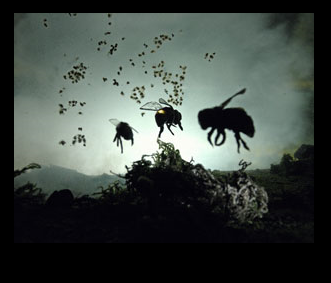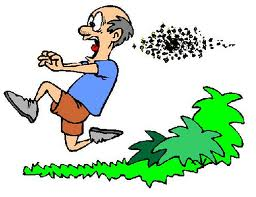Honey Bee Agression
Biology 342 Fall 2012
Tess Myers
Why do bees attack and defend?
Like many organisms that store nutrients, honey bees must defend the large stores of nutritionally valuable honey they produce. Desired by everyone from the honey badger to the hungry human, many predators are willing to risk the stings and swarmings for a taste. In order to fend off these marauding invaders, bees are equipped with their stingers, venom, and a sense of when to attack. Most varieties of bee limit their behavior to defense- it is only when the hive is perturbed that they rally to attack. For other varieties, such as the Africanized bees, members have been known to display aggressive behavior such as circling and swarming when an intruder ventures too close to their home.
In addition to large predators searching to an addendum to their diet, bees also have to defend against neighboring “robber” bees, who are out to thieve honey. This behavior is seen at times when nectar producing flowers are scarce, and the hives must look for alternate sources of food.
The bees must also protect their queen and her young. Many varieties of wasp prey on bee larva as food, and other insects such as spiders are happy to make a meal out of bees or their larvae
.
But if the bee dies when it stings, how is defending the colony helpful to the bee??
That's an interesting question: Because bees die when they sting, how could it possibly be evolutionarily beneficial for bees to defend their colonies? The answer is in the eusocial structure of the colony. Unlike many other animal societies, where each member has the option to reproduce and spread their genes, only the Queen bee has the ability to reproduce. She lays thousands of eggs, some of which will develop to be sterile female worker bees, others who will become male drones capable of mating, but not much else, and even a few queen bee larvae, who might develop to become queens of a new colony. As long as the worker bees are defending this source of their genetic material, then bees who die in combat are only benefiting their genes, evolutionarily speaking. As humans, this can be hard to understand, since we do not live like this, but the truth of it is that a fallen worker bee is very quickly replaced.

